Brexit's Economic and Political Ramifications for the European Union
VerifiedAdded on 2022/10/19
|8
|2917
|15
Report
AI Summary
This report provides a comprehensive political science analysis of the impact of Brexit on the European Union. It explores the potential costs related to trade, the financial services sector (particularly the City of London), and the loss of access to the EU market. The report examines various perspectives on Brexit's effects on trade, foreign investment, and the public sector, considering different trade agreement scenarios between the UK and the EU. It also analyzes the implications for the UK's future relationship with the United States, highlighting potential strains and challenges. The report concludes by emphasizing the complexity of the situation, the early stage of Brexit's implementation, and the need for further observation of its long-term consequences, including the impact on transatlantic relations. The report also includes an annotated bibliography of relevant sources.

Running head: POLITICAL SCIENCE
POLITICAL SCIENCE
Name of the Student:
Name of the University:
Author note:
POLITICAL SCIENCE
Name of the Student:
Name of the University:
Author note:
Paraphrase This Document
Need a fresh take? Get an instant paraphrase of this document with our AI Paraphraser
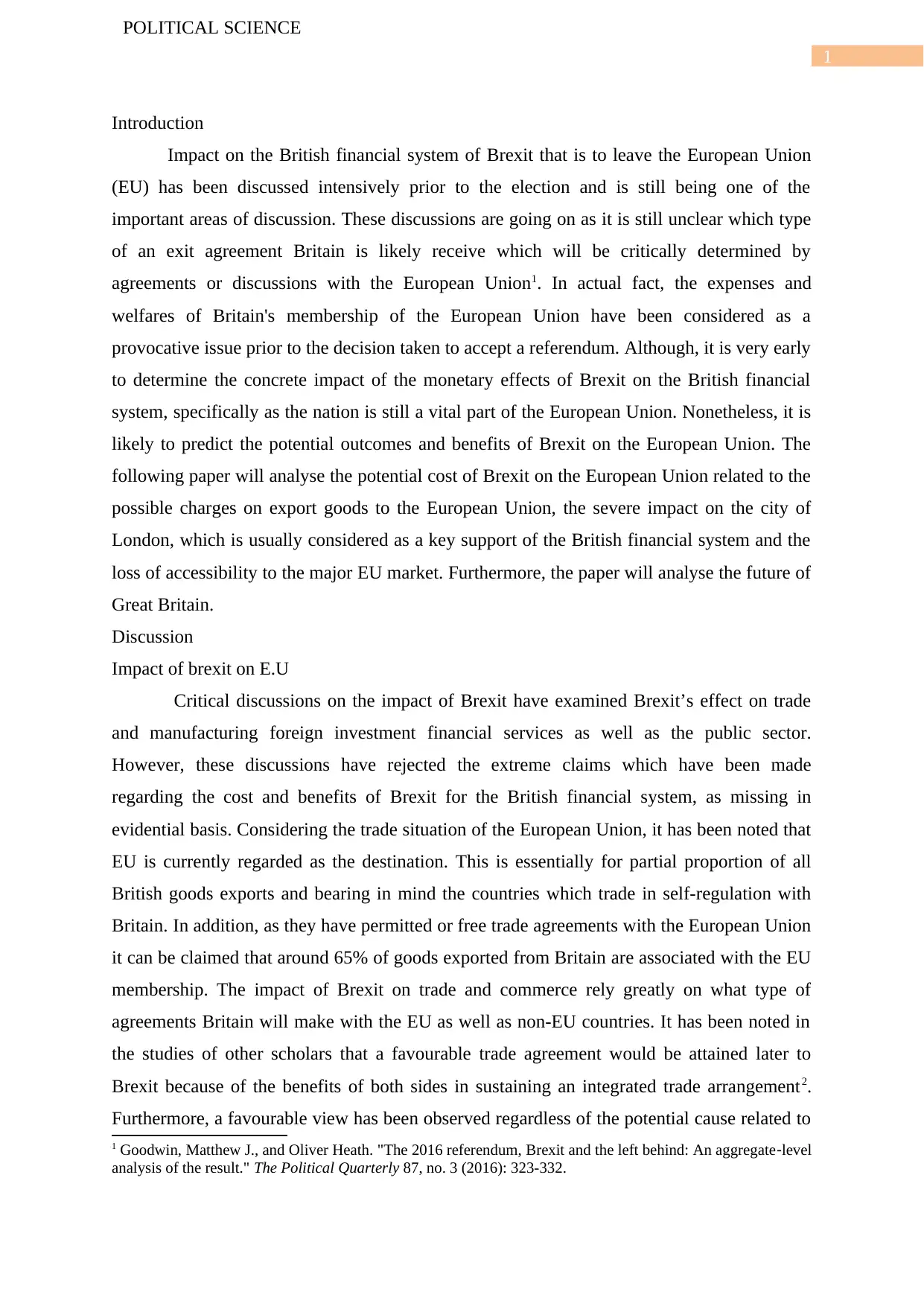
1
POLITICAL SCIENCE
Introduction
Impact on the British financial system of Brexit that is to leave the European Union
(EU) has been discussed intensively prior to the election and is still being one of the
important areas of discussion. These discussions are going on as it is still unclear which type
of an exit agreement Britain is likely receive which will be critically determined by
agreements or discussions with the European Union1. In actual fact, the expenses and
welfares of Britain's membership of the European Union have been considered as a
provocative issue prior to the decision taken to accept a referendum. Although, it is very early
to determine the concrete impact of the monetary effects of Brexit on the British financial
system, specifically as the nation is still a vital part of the European Union. Nonetheless, it is
likely to predict the potential outcomes and benefits of Brexit on the European Union. The
following paper will analyse the potential cost of Brexit on the European Union related to the
possible charges on export goods to the European Union, the severe impact on the city of
London, which is usually considered as a key support of the British financial system and the
loss of accessibility to the major EU market. Furthermore, the paper will analyse the future of
Great Britain.
Discussion
Impact of brexit on E.U
Critical discussions on the impact of Brexit have examined Brexit’s effect on trade
and manufacturing foreign investment financial services as well as the public sector.
However, these discussions have rejected the extreme claims which have been made
regarding the cost and benefits of Brexit for the British financial system, as missing in
evidential basis. Considering the trade situation of the European Union, it has been noted that
EU is currently regarded as the destination. This is essentially for partial proportion of all
British goods exports and bearing in mind the countries which trade in self-regulation with
Britain. In addition, as they have permitted or free trade agreements with the European Union
it can be claimed that around 65% of goods exported from Britain are associated with the EU
membership. The impact of Brexit on trade and commerce rely greatly on what type of
agreements Britain will make with the EU as well as non-EU countries. It has been noted in
the studies of other scholars that a favourable trade agreement would be attained later to
Brexit because of the benefits of both sides in sustaining an integrated trade arrangement2.
Furthermore, a favourable view has been observed regardless of the potential cause related to
1 Goodwin, Matthew J., and Oliver Heath. "The 2016 referendum, Brexit and the left behind: An aggregate‐level
analysis of the result." The Political Quarterly 87, no. 3 (2016): 323-332.
POLITICAL SCIENCE
Introduction
Impact on the British financial system of Brexit that is to leave the European Union
(EU) has been discussed intensively prior to the election and is still being one of the
important areas of discussion. These discussions are going on as it is still unclear which type
of an exit agreement Britain is likely receive which will be critically determined by
agreements or discussions with the European Union1. In actual fact, the expenses and
welfares of Britain's membership of the European Union have been considered as a
provocative issue prior to the decision taken to accept a referendum. Although, it is very early
to determine the concrete impact of the monetary effects of Brexit on the British financial
system, specifically as the nation is still a vital part of the European Union. Nonetheless, it is
likely to predict the potential outcomes and benefits of Brexit on the European Union. The
following paper will analyse the potential cost of Brexit on the European Union related to the
possible charges on export goods to the European Union, the severe impact on the city of
London, which is usually considered as a key support of the British financial system and the
loss of accessibility to the major EU market. Furthermore, the paper will analyse the future of
Great Britain.
Discussion
Impact of brexit on E.U
Critical discussions on the impact of Brexit have examined Brexit’s effect on trade
and manufacturing foreign investment financial services as well as the public sector.
However, these discussions have rejected the extreme claims which have been made
regarding the cost and benefits of Brexit for the British financial system, as missing in
evidential basis. Considering the trade situation of the European Union, it has been noted that
EU is currently regarded as the destination. This is essentially for partial proportion of all
British goods exports and bearing in mind the countries which trade in self-regulation with
Britain. In addition, as they have permitted or free trade agreements with the European Union
it can be claimed that around 65% of goods exported from Britain are associated with the EU
membership. The impact of Brexit on trade and commerce rely greatly on what type of
agreements Britain will make with the EU as well as non-EU countries. It has been noted in
the studies of other scholars that a favourable trade agreement would be attained later to
Brexit because of the benefits of both sides in sustaining an integrated trade arrangement2.
Furthermore, a favourable view has been observed regardless of the potential cause related to
1 Goodwin, Matthew J., and Oliver Heath. "The 2016 referendum, Brexit and the left behind: An aggregate‐level
analysis of the result." The Political Quarterly 87, no. 3 (2016): 323-332.
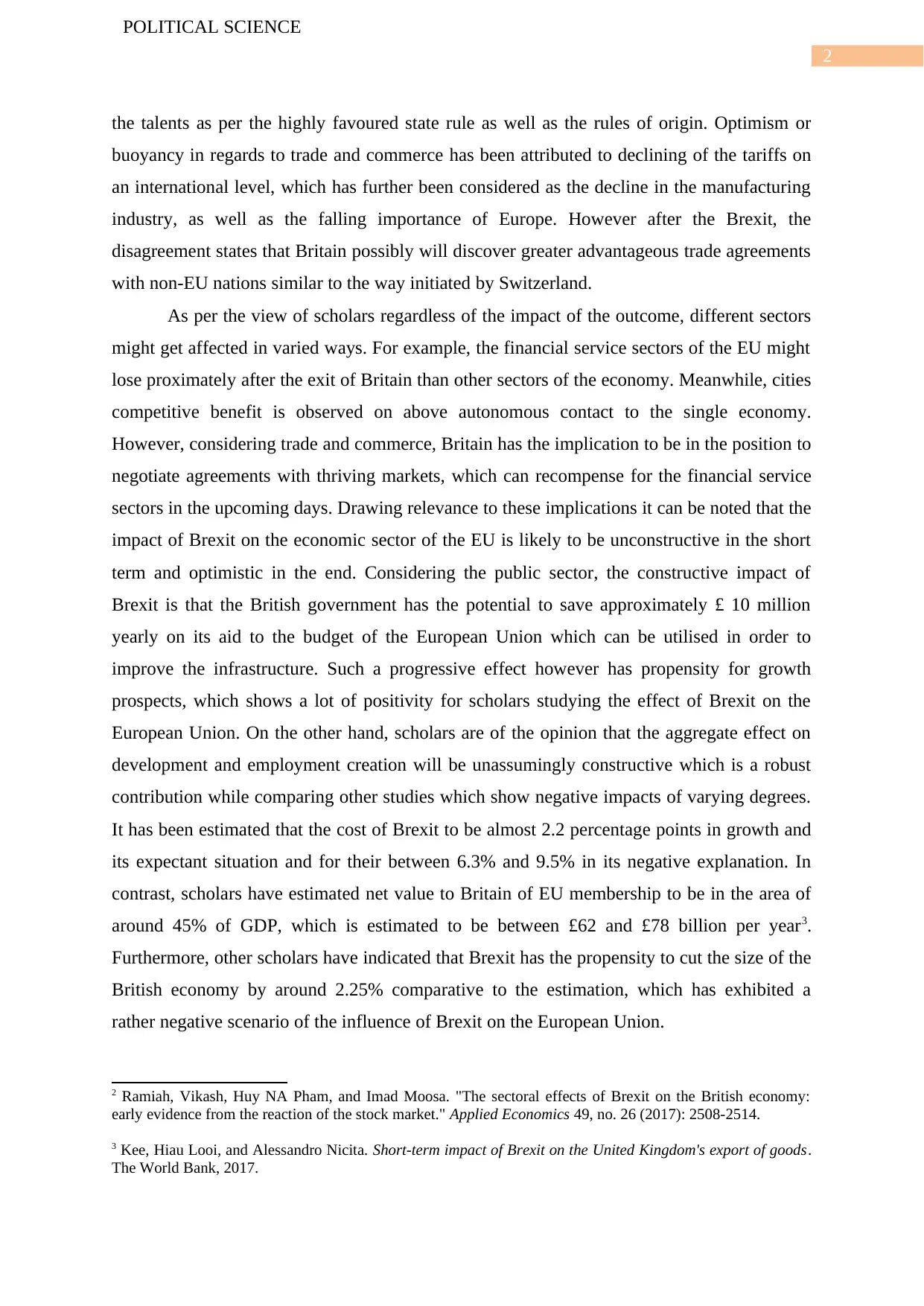
2
POLITICAL SCIENCE
the talents as per the highly favoured state rule as well as the rules of origin. Optimism or
buoyancy in regards to trade and commerce has been attributed to declining of the tariffs on
an international level, which has further been considered as the decline in the manufacturing
industry, as well as the falling importance of Europe. However after the Brexit, the
disagreement states that Britain possibly will discover greater advantageous trade agreements
with non-EU nations similar to the way initiated by Switzerland.
As per the view of scholars regardless of the impact of the outcome, different sectors
might get affected in varied ways. For example, the financial service sectors of the EU might
lose proximately after the exit of Britain than other sectors of the economy. Meanwhile, cities
competitive benefit is observed on above autonomous contact to the single economy.
However, considering trade and commerce, Britain has the implication to be in the position to
negotiate agreements with thriving markets, which can recompense for the financial service
sectors in the upcoming days. Drawing relevance to these implications it can be noted that the
impact of Brexit on the economic sector of the EU is likely to be unconstructive in the short
term and optimistic in the end. Considering the public sector, the constructive impact of
Brexit is that the British government has the potential to save approximately £ 10 million
yearly on its aid to the budget of the European Union which can be utilised in order to
improve the infrastructure. Such a progressive effect however has propensity for growth
prospects, which shows a lot of positivity for scholars studying the effect of Brexit on the
European Union. On the other hand, scholars are of the opinion that the aggregate effect on
development and employment creation will be unassumingly constructive which is a robust
contribution while comparing other studies which show negative impacts of varying degrees.
It has been estimated that the cost of Brexit to be almost 2.2 percentage points in growth and
its expectant situation and for their between 6.3% and 9.5% in its negative explanation. In
contrast, scholars have estimated net value to Britain of EU membership to be in the area of
around 45% of GDP, which is estimated to be between £62 and £78 billion per year3.
Furthermore, other scholars have indicated that Brexit has the propensity to cut the size of the
British economy by around 2.25% comparative to the estimation, which has exhibited a
rather negative scenario of the influence of Brexit on the European Union.
2 Ramiah, Vikash, Huy NA Pham, and Imad Moosa. "The sectoral effects of Brexit on the British economy:
early evidence from the reaction of the stock market." Applied Economics 49, no. 26 (2017): 2508-2514.
3 Kee, Hiau Looi, and Alessandro Nicita. Short-term impact of Brexit on the United Kingdom's export of goods.
The World Bank, 2017.
POLITICAL SCIENCE
the talents as per the highly favoured state rule as well as the rules of origin. Optimism or
buoyancy in regards to trade and commerce has been attributed to declining of the tariffs on
an international level, which has further been considered as the decline in the manufacturing
industry, as well as the falling importance of Europe. However after the Brexit, the
disagreement states that Britain possibly will discover greater advantageous trade agreements
with non-EU nations similar to the way initiated by Switzerland.
As per the view of scholars regardless of the impact of the outcome, different sectors
might get affected in varied ways. For example, the financial service sectors of the EU might
lose proximately after the exit of Britain than other sectors of the economy. Meanwhile, cities
competitive benefit is observed on above autonomous contact to the single economy.
However, considering trade and commerce, Britain has the implication to be in the position to
negotiate agreements with thriving markets, which can recompense for the financial service
sectors in the upcoming days. Drawing relevance to these implications it can be noted that the
impact of Brexit on the economic sector of the EU is likely to be unconstructive in the short
term and optimistic in the end. Considering the public sector, the constructive impact of
Brexit is that the British government has the potential to save approximately £ 10 million
yearly on its aid to the budget of the European Union which can be utilised in order to
improve the infrastructure. Such a progressive effect however has propensity for growth
prospects, which shows a lot of positivity for scholars studying the effect of Brexit on the
European Union. On the other hand, scholars are of the opinion that the aggregate effect on
development and employment creation will be unassumingly constructive which is a robust
contribution while comparing other studies which show negative impacts of varying degrees.
It has been estimated that the cost of Brexit to be almost 2.2 percentage points in growth and
its expectant situation and for their between 6.3% and 9.5% in its negative explanation. In
contrast, scholars have estimated net value to Britain of EU membership to be in the area of
around 45% of GDP, which is estimated to be between £62 and £78 billion per year3.
Furthermore, other scholars have indicated that Brexit has the propensity to cut the size of the
British economy by around 2.25% comparative to the estimation, which has exhibited a
rather negative scenario of the influence of Brexit on the European Union.
2 Ramiah, Vikash, Huy NA Pham, and Imad Moosa. "The sectoral effects of Brexit on the British economy:
early evidence from the reaction of the stock market." Applied Economics 49, no. 26 (2017): 2508-2514.
3 Kee, Hiau Looi, and Alessandro Nicita. Short-term impact of Brexit on the United Kingdom's export of goods.
The World Bank, 2017.
⊘ This is a preview!⊘
Do you want full access?
Subscribe today to unlock all pages.

Trusted by 1+ million students worldwide
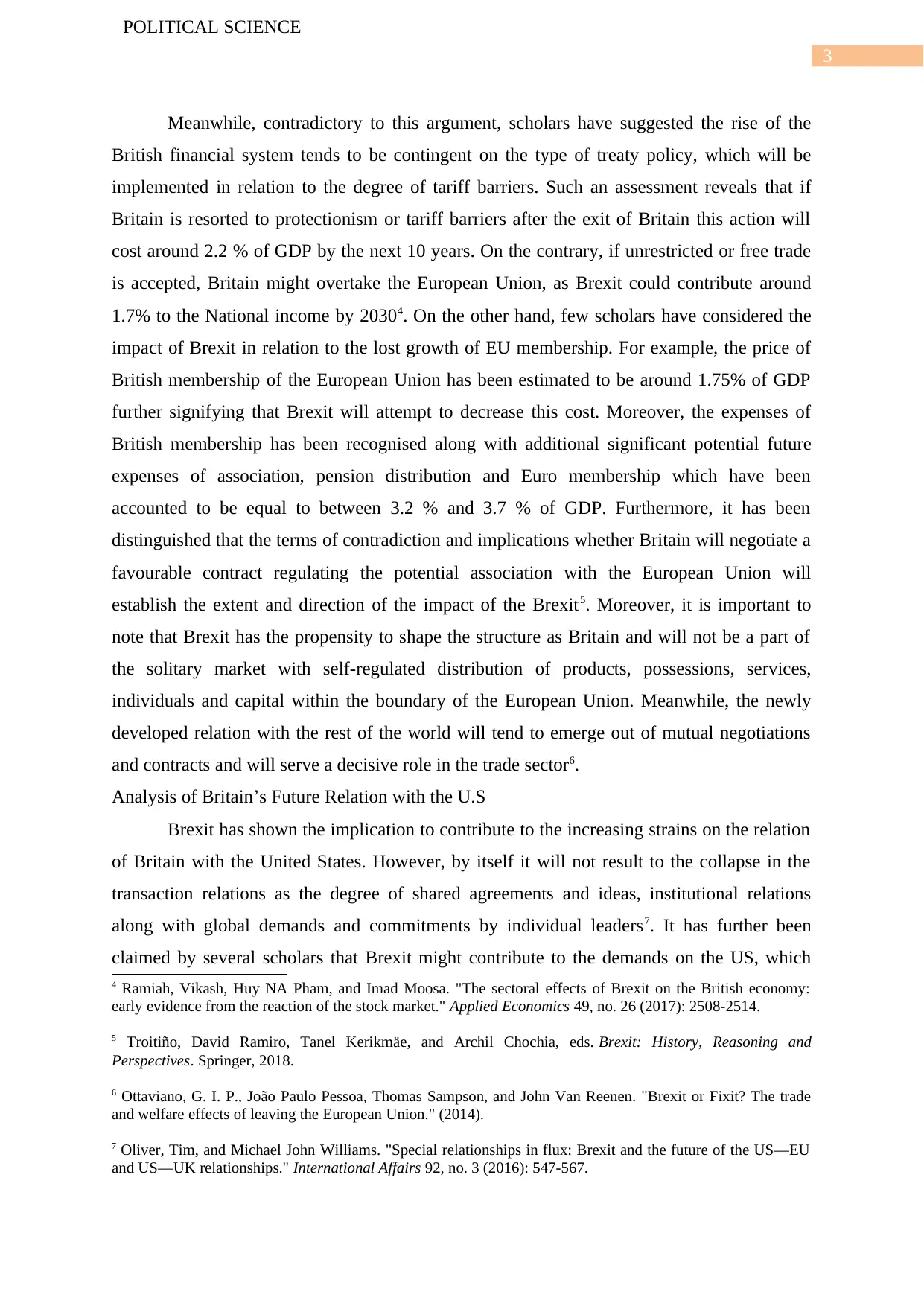
3
POLITICAL SCIENCE
Meanwhile, contradictory to this argument, scholars have suggested the rise of the
British financial system tends to be contingent on the type of treaty policy, which will be
implemented in relation to the degree of tariff barriers. Such an assessment reveals that if
Britain is resorted to protectionism or tariff barriers after the exit of Britain this action will
cost around 2.2 % of GDP by the next 10 years. On the contrary, if unrestricted or free trade
is accepted, Britain might overtake the European Union, as Brexit could contribute around
1.7% to the National income by 20304. On the other hand, few scholars have considered the
impact of Brexit in relation to the lost growth of EU membership. For example, the price of
British membership of the European Union has been estimated to be around 1.75% of GDP
further signifying that Brexit will attempt to decrease this cost. Moreover, the expenses of
British membership has been recognised along with additional significant potential future
expenses of association, pension distribution and Euro membership which have been
accounted to be equal to between 3.2 % and 3.7 % of GDP. Furthermore, it has been
distinguished that the terms of contradiction and implications whether Britain will negotiate a
favourable contract regulating the potential association with the European Union will
establish the extent and direction of the impact of the Brexit5. Moreover, it is important to
note that Brexit has the propensity to shape the structure as Britain and will not be a part of
the solitary market with self-regulated distribution of products, possessions, services,
individuals and capital within the boundary of the European Union. Meanwhile, the newly
developed relation with the rest of the world will tend to emerge out of mutual negotiations
and contracts and will serve a decisive role in the trade sector6.
Analysis of Britain’s Future Relation with the U.S
Brexit has shown the implication to contribute to the increasing strains on the relation
of Britain with the United States. However, by itself it will not result to the collapse in the
transaction relations as the degree of shared agreements and ideas, institutional relations
along with global demands and commitments by individual leaders7. It has further been
claimed by several scholars that Brexit might contribute to the demands on the US, which
4 Ramiah, Vikash, Huy NA Pham, and Imad Moosa. "The sectoral effects of Brexit on the British economy:
early evidence from the reaction of the stock market." Applied Economics 49, no. 26 (2017): 2508-2514.
5 Troitiño, David Ramiro, Tanel Kerikmäe, and Archil Chochia, eds. Brexit: History, Reasoning and
Perspectives. Springer, 2018.
6 Ottaviano, G. I. P., João Paulo Pessoa, Thomas Sampson, and John Van Reenen. "Brexit or Fixit? The trade
and welfare effects of leaving the European Union." (2014).
7 Oliver, Tim, and Michael John Williams. "Special relationships in flux: Brexit and the future of the US—EU
and US—UK relationships." International Affairs 92, no. 3 (2016): 547-567.
POLITICAL SCIENCE
Meanwhile, contradictory to this argument, scholars have suggested the rise of the
British financial system tends to be contingent on the type of treaty policy, which will be
implemented in relation to the degree of tariff barriers. Such an assessment reveals that if
Britain is resorted to protectionism or tariff barriers after the exit of Britain this action will
cost around 2.2 % of GDP by the next 10 years. On the contrary, if unrestricted or free trade
is accepted, Britain might overtake the European Union, as Brexit could contribute around
1.7% to the National income by 20304. On the other hand, few scholars have considered the
impact of Brexit in relation to the lost growth of EU membership. For example, the price of
British membership of the European Union has been estimated to be around 1.75% of GDP
further signifying that Brexit will attempt to decrease this cost. Moreover, the expenses of
British membership has been recognised along with additional significant potential future
expenses of association, pension distribution and Euro membership which have been
accounted to be equal to between 3.2 % and 3.7 % of GDP. Furthermore, it has been
distinguished that the terms of contradiction and implications whether Britain will negotiate a
favourable contract regulating the potential association with the European Union will
establish the extent and direction of the impact of the Brexit5. Moreover, it is important to
note that Brexit has the propensity to shape the structure as Britain and will not be a part of
the solitary market with self-regulated distribution of products, possessions, services,
individuals and capital within the boundary of the European Union. Meanwhile, the newly
developed relation with the rest of the world will tend to emerge out of mutual negotiations
and contracts and will serve a decisive role in the trade sector6.
Analysis of Britain’s Future Relation with the U.S
Brexit has shown the implication to contribute to the increasing strains on the relation
of Britain with the United States. However, by itself it will not result to the collapse in the
transaction relations as the degree of shared agreements and ideas, institutional relations
along with global demands and commitments by individual leaders7. It has further been
claimed by several scholars that Brexit might contribute to the demands on the US, which
4 Ramiah, Vikash, Huy NA Pham, and Imad Moosa. "The sectoral effects of Brexit on the British economy:
early evidence from the reaction of the stock market." Applied Economics 49, no. 26 (2017): 2508-2514.
5 Troitiño, David Ramiro, Tanel Kerikmäe, and Archil Chochia, eds. Brexit: History, Reasoning and
Perspectives. Springer, 2018.
6 Ottaviano, G. I. P., João Paulo Pessoa, Thomas Sampson, and John Van Reenen. "Brexit or Fixit? The trade
and welfare effects of leaving the European Union." (2014).
7 Oliver, Tim, and Michael John Williams. "Special relationships in flux: Brexit and the future of the US—EU
and US—UK relationships." International Affairs 92, no. 3 (2016): 547-567.
Paraphrase This Document
Need a fresh take? Get an instant paraphrase of this document with our AI Paraphraser
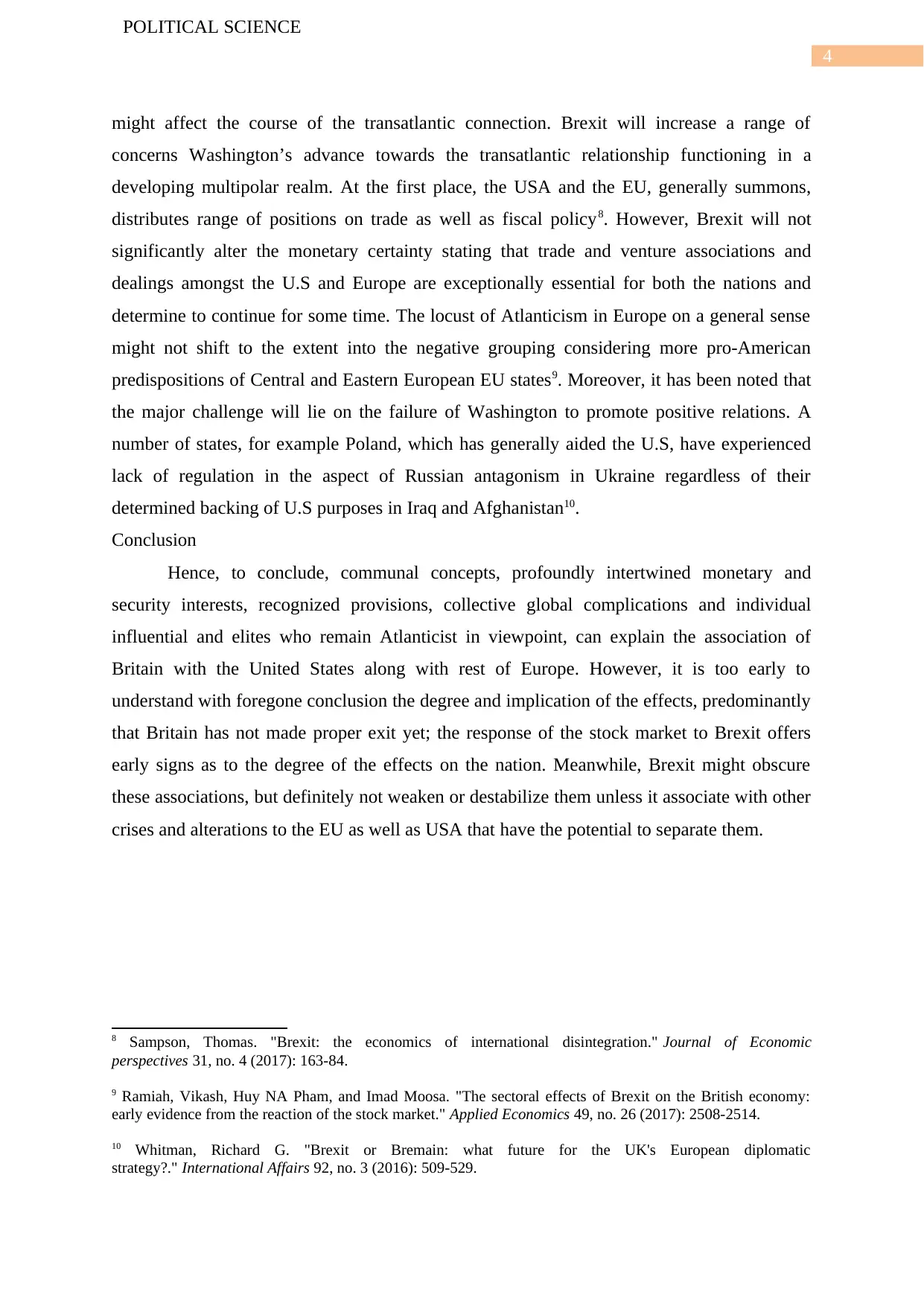
4
POLITICAL SCIENCE
might affect the course of the transatlantic connection. Brexit will increase a range of
concerns Washington’s advance towards the transatlantic relationship functioning in a
developing multipolar realm. At the first place, the USA and the EU, generally summons,
distributes range of positions on trade as well as fiscal policy8. However, Brexit will not
significantly alter the monetary certainty stating that trade and venture associations and
dealings amongst the U.S and Europe are exceptionally essential for both the nations and
determine to continue for some time. The locust of Atlanticism in Europe on a general sense
might not shift to the extent into the negative grouping considering more pro-American
predispositions of Central and Eastern European EU states9. Moreover, it has been noted that
the major challenge will lie on the failure of Washington to promote positive relations. A
number of states, for example Poland, which has generally aided the U.S, have experienced
lack of regulation in the aspect of Russian antagonism in Ukraine regardless of their
determined backing of U.S purposes in Iraq and Afghanistan10.
Conclusion
Hence, to conclude, communal concepts, profoundly intertwined monetary and
security interests, recognized provisions, collective global complications and individual
influential and elites who remain Atlanticist in viewpoint, can explain the association of
Britain with the United States along with rest of Europe. However, it is too early to
understand with foregone conclusion the degree and implication of the effects, predominantly
that Britain has not made proper exit yet; the response of the stock market to Brexit offers
early signs as to the degree of the effects on the nation. Meanwhile, Brexit might obscure
these associations, but definitely not weaken or destabilize them unless it associate with other
crises and alterations to the EU as well as USA that have the potential to separate them.
8 Sampson, Thomas. "Brexit: the economics of international disintegration." Journal of Economic
perspectives 31, no. 4 (2017): 163-84.
9 Ramiah, Vikash, Huy NA Pham, and Imad Moosa. "The sectoral effects of Brexit on the British economy:
early evidence from the reaction of the stock market." Applied Economics 49, no. 26 (2017): 2508-2514.
10 Whitman, Richard G. "Brexit or Bremain: what future for the UK's European diplomatic
strategy?." International Affairs 92, no. 3 (2016): 509-529.
POLITICAL SCIENCE
might affect the course of the transatlantic connection. Brexit will increase a range of
concerns Washington’s advance towards the transatlantic relationship functioning in a
developing multipolar realm. At the first place, the USA and the EU, generally summons,
distributes range of positions on trade as well as fiscal policy8. However, Brexit will not
significantly alter the monetary certainty stating that trade and venture associations and
dealings amongst the U.S and Europe are exceptionally essential for both the nations and
determine to continue for some time. The locust of Atlanticism in Europe on a general sense
might not shift to the extent into the negative grouping considering more pro-American
predispositions of Central and Eastern European EU states9. Moreover, it has been noted that
the major challenge will lie on the failure of Washington to promote positive relations. A
number of states, for example Poland, which has generally aided the U.S, have experienced
lack of regulation in the aspect of Russian antagonism in Ukraine regardless of their
determined backing of U.S purposes in Iraq and Afghanistan10.
Conclusion
Hence, to conclude, communal concepts, profoundly intertwined monetary and
security interests, recognized provisions, collective global complications and individual
influential and elites who remain Atlanticist in viewpoint, can explain the association of
Britain with the United States along with rest of Europe. However, it is too early to
understand with foregone conclusion the degree and implication of the effects, predominantly
that Britain has not made proper exit yet; the response of the stock market to Brexit offers
early signs as to the degree of the effects on the nation. Meanwhile, Brexit might obscure
these associations, but definitely not weaken or destabilize them unless it associate with other
crises and alterations to the EU as well as USA that have the potential to separate them.
8 Sampson, Thomas. "Brexit: the economics of international disintegration." Journal of Economic
perspectives 31, no. 4 (2017): 163-84.
9 Ramiah, Vikash, Huy NA Pham, and Imad Moosa. "The sectoral effects of Brexit on the British economy:
early evidence from the reaction of the stock market." Applied Economics 49, no. 26 (2017): 2508-2514.
10 Whitman, Richard G. "Brexit or Bremain: what future for the UK's European diplomatic
strategy?." International Affairs 92, no. 3 (2016): 509-529.
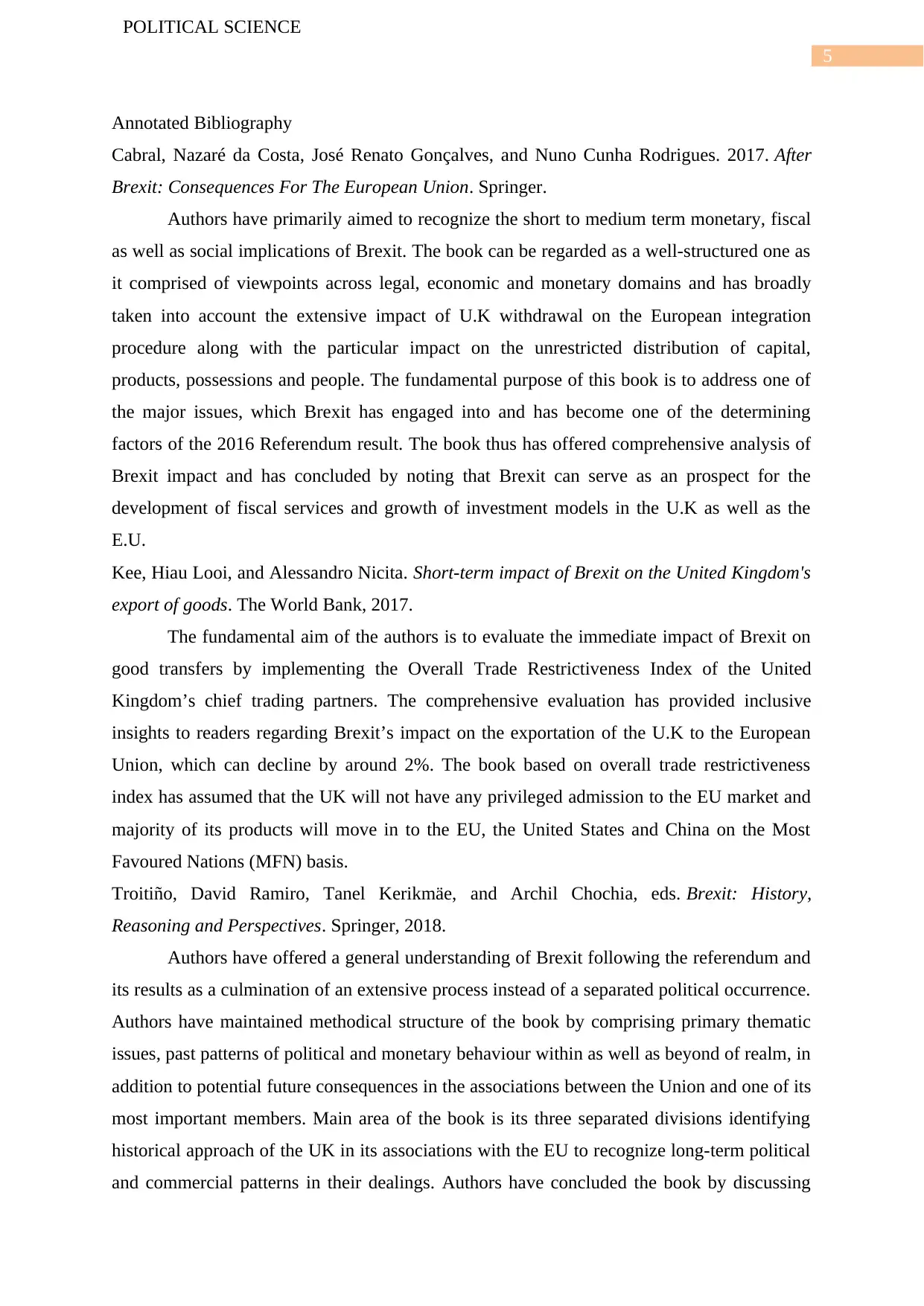
5
POLITICAL SCIENCE
Annotated Bibliography
Cabral, Nazaré da Costa, José Renato Gonçalves, and Nuno Cunha Rodrigues. 2017. After
Brexit: Consequences For The European Union. Springer.
Authors have primarily aimed to recognize the short to medium term monetary, fiscal
as well as social implications of Brexit. The book can be regarded as a well-structured one as
it comprised of viewpoints across legal, economic and monetary domains and has broadly
taken into account the extensive impact of U.K withdrawal on the European integration
procedure along with the particular impact on the unrestricted distribution of capital,
products, possessions and people. The fundamental purpose of this book is to address one of
the major issues, which Brexit has engaged into and has become one of the determining
factors of the 2016 Referendum result. The book thus has offered comprehensive analysis of
Brexit impact and has concluded by noting that Brexit can serve as an prospect for the
development of fiscal services and growth of investment models in the U.K as well as the
E.U.
Kee, Hiau Looi, and Alessandro Nicita. Short-term impact of Brexit on the United Kingdom's
export of goods. The World Bank, 2017.
The fundamental aim of the authors is to evaluate the immediate impact of Brexit on
good transfers by implementing the Overall Trade Restrictiveness Index of the United
Kingdom’s chief trading partners. The comprehensive evaluation has provided inclusive
insights to readers regarding Brexit’s impact on the exportation of the U.K to the European
Union, which can decline by around 2%. The book based on overall trade restrictiveness
index has assumed that the UK will not have any privileged admission to the EU market and
majority of its products will move in to the EU, the United States and China on the Most
Favoured Nations (MFN) basis.
Troitiño, David Ramiro, Tanel Kerikmäe, and Archil Chochia, eds. Brexit: History,
Reasoning and Perspectives. Springer, 2018.
Authors have offered a general understanding of Brexit following the referendum and
its results as a culmination of an extensive process instead of a separated political occurrence.
Authors have maintained methodical structure of the book by comprising primary thematic
issues, past patterns of political and monetary behaviour within as well as beyond of realm, in
addition to potential future consequences in the associations between the Union and one of its
most important members. Main area of the book is its three separated divisions identifying
historical approach of the UK in its associations with the EU to recognize long-term political
and commercial patterns in their dealings. Authors have concluded the book by discussing
POLITICAL SCIENCE
Annotated Bibliography
Cabral, Nazaré da Costa, José Renato Gonçalves, and Nuno Cunha Rodrigues. 2017. After
Brexit: Consequences For The European Union. Springer.
Authors have primarily aimed to recognize the short to medium term monetary, fiscal
as well as social implications of Brexit. The book can be regarded as a well-structured one as
it comprised of viewpoints across legal, economic and monetary domains and has broadly
taken into account the extensive impact of U.K withdrawal on the European integration
procedure along with the particular impact on the unrestricted distribution of capital,
products, possessions and people. The fundamental purpose of this book is to address one of
the major issues, which Brexit has engaged into and has become one of the determining
factors of the 2016 Referendum result. The book thus has offered comprehensive analysis of
Brexit impact and has concluded by noting that Brexit can serve as an prospect for the
development of fiscal services and growth of investment models in the U.K as well as the
E.U.
Kee, Hiau Looi, and Alessandro Nicita. Short-term impact of Brexit on the United Kingdom's
export of goods. The World Bank, 2017.
The fundamental aim of the authors is to evaluate the immediate impact of Brexit on
good transfers by implementing the Overall Trade Restrictiveness Index of the United
Kingdom’s chief trading partners. The comprehensive evaluation has provided inclusive
insights to readers regarding Brexit’s impact on the exportation of the U.K to the European
Union, which can decline by around 2%. The book based on overall trade restrictiveness
index has assumed that the UK will not have any privileged admission to the EU market and
majority of its products will move in to the EU, the United States and China on the Most
Favoured Nations (MFN) basis.
Troitiño, David Ramiro, Tanel Kerikmäe, and Archil Chochia, eds. Brexit: History,
Reasoning and Perspectives. Springer, 2018.
Authors have offered a general understanding of Brexit following the referendum and
its results as a culmination of an extensive process instead of a separated political occurrence.
Authors have maintained methodical structure of the book by comprising primary thematic
issues, past patterns of political and monetary behaviour within as well as beyond of realm, in
addition to potential future consequences in the associations between the Union and one of its
most important members. Main area of the book is its three separated divisions identifying
historical approach of the UK in its associations with the EU to recognize long-term political
and commercial patterns in their dealings. Authors have concluded the book by discussing
⊘ This is a preview!⊘
Do you want full access?
Subscribe today to unlock all pages.

Trusted by 1+ million students worldwide
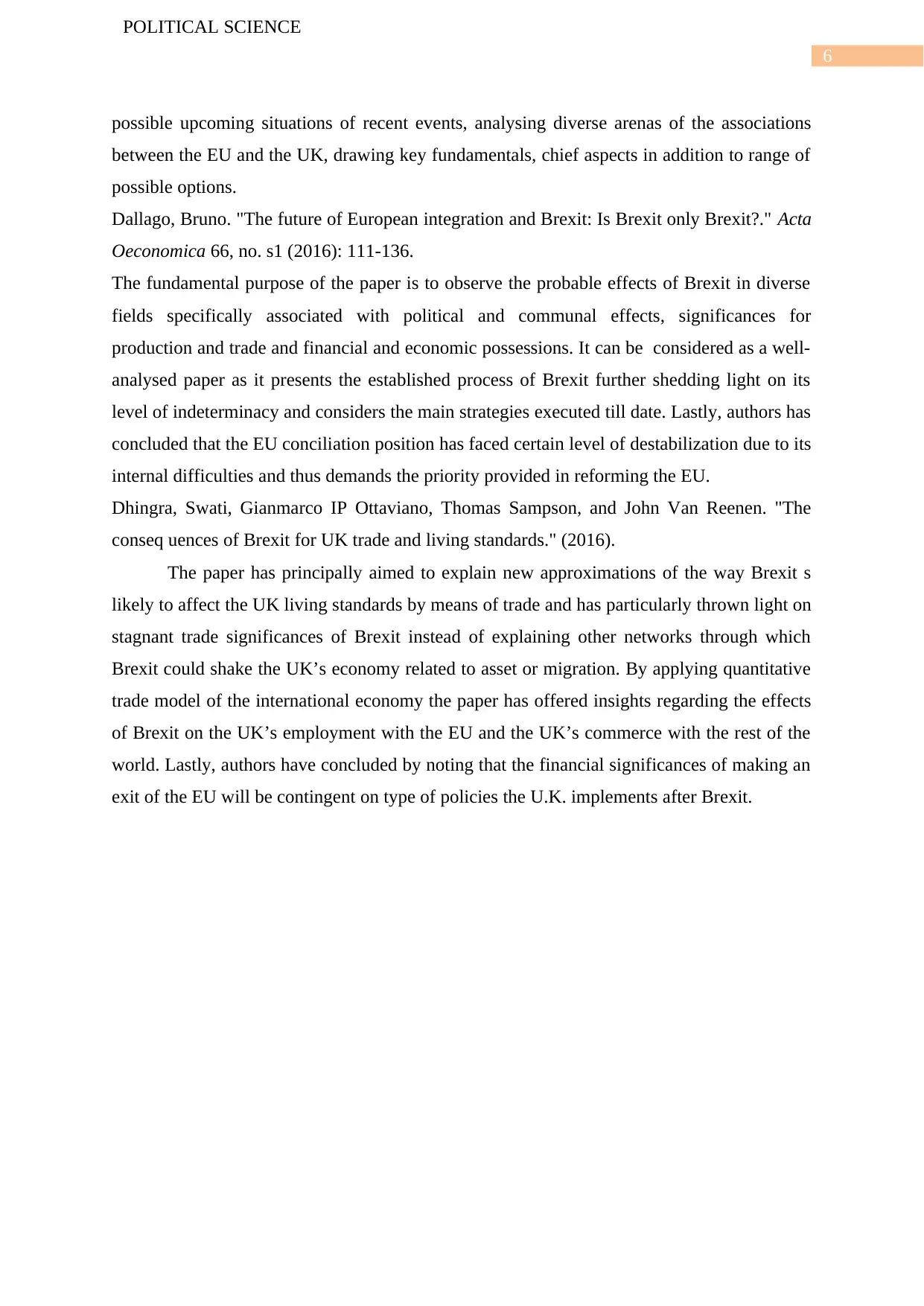
6
POLITICAL SCIENCE
possible upcoming situations of recent events, analysing diverse arenas of the associations
between the EU and the UK, drawing key fundamentals, chief aspects in addition to range of
possible options.
Dallago, Bruno. "The future of European integration and Brexit: Is Brexit only Brexit?." Acta
Oeconomica 66, no. s1 (2016): 111-136.
The fundamental purpose of the paper is to observe the probable effects of Brexit in diverse
fields specifically associated with political and communal effects, significances for
production and trade and financial and economic possessions. It can be considered as a well-
analysed paper as it presents the established process of Brexit further shedding light on its
level of indeterminacy and considers the main strategies executed till date. Lastly, authors has
concluded that the EU conciliation position has faced certain level of destabilization due to its
internal difficulties and thus demands the priority provided in reforming the EU.
Dhingra, Swati, Gianmarco IP Ottaviano, Thomas Sampson, and John Van Reenen. "The
conseq uences of Brexit for UK trade and living standards." (2016).
The paper has principally aimed to explain new approximations of the way Brexit s
likely to affect the UK living standards by means of trade and has particularly thrown light on
stagnant trade significances of Brexit instead of explaining other networks through which
Brexit could shake the UK’s economy related to asset or migration. By applying quantitative
trade model of the international economy the paper has offered insights regarding the effects
of Brexit on the UK’s employment with the EU and the UK’s commerce with the rest of the
world. Lastly, authors have concluded by noting that the financial significances of making an
exit of the EU will be contingent on type of policies the U.K. implements after Brexit.
POLITICAL SCIENCE
possible upcoming situations of recent events, analysing diverse arenas of the associations
between the EU and the UK, drawing key fundamentals, chief aspects in addition to range of
possible options.
Dallago, Bruno. "The future of European integration and Brexit: Is Brexit only Brexit?." Acta
Oeconomica 66, no. s1 (2016): 111-136.
The fundamental purpose of the paper is to observe the probable effects of Brexit in diverse
fields specifically associated with political and communal effects, significances for
production and trade and financial and economic possessions. It can be considered as a well-
analysed paper as it presents the established process of Brexit further shedding light on its
level of indeterminacy and considers the main strategies executed till date. Lastly, authors has
concluded that the EU conciliation position has faced certain level of destabilization due to its
internal difficulties and thus demands the priority provided in reforming the EU.
Dhingra, Swati, Gianmarco IP Ottaviano, Thomas Sampson, and John Van Reenen. "The
conseq uences of Brexit for UK trade and living standards." (2016).
The paper has principally aimed to explain new approximations of the way Brexit s
likely to affect the UK living standards by means of trade and has particularly thrown light on
stagnant trade significances of Brexit instead of explaining other networks through which
Brexit could shake the UK’s economy related to asset or migration. By applying quantitative
trade model of the international economy the paper has offered insights regarding the effects
of Brexit on the UK’s employment with the EU and the UK’s commerce with the rest of the
world. Lastly, authors have concluded by noting that the financial significances of making an
exit of the EU will be contingent on type of policies the U.K. implements after Brexit.
Paraphrase This Document
Need a fresh take? Get an instant paraphrase of this document with our AI Paraphraser
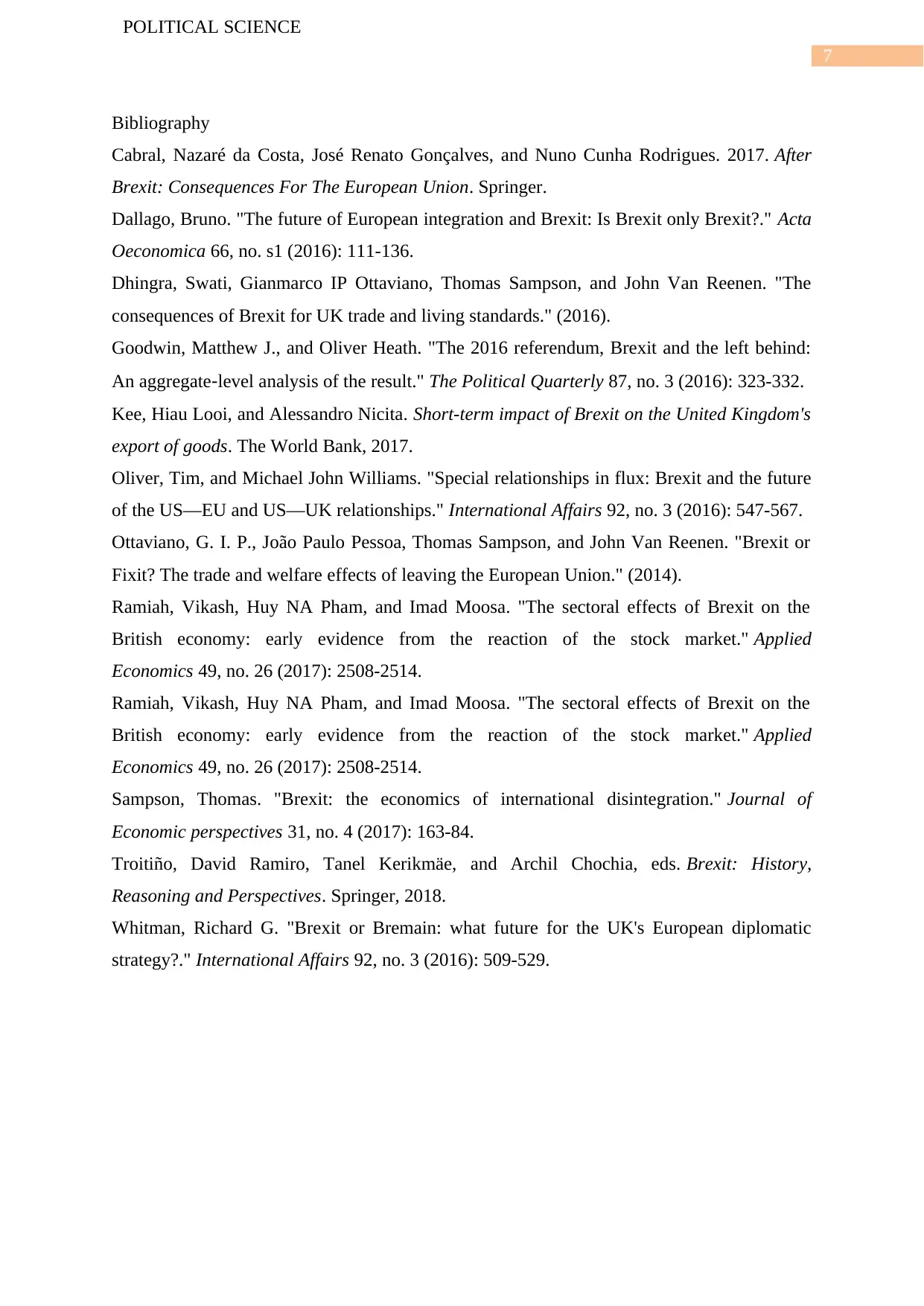
7
POLITICAL SCIENCE
Bibliography
Cabral, Nazaré da Costa, José Renato Gonçalves, and Nuno Cunha Rodrigues. 2017. After
Brexit: Consequences For The European Union. Springer.
Dallago, Bruno. "The future of European integration and Brexit: Is Brexit only Brexit?." Acta
Oeconomica 66, no. s1 (2016): 111-136.
Dhingra, Swati, Gianmarco IP Ottaviano, Thomas Sampson, and John Van Reenen. "The
consequences of Brexit for UK trade and living standards." (2016).
Goodwin, Matthew J., and Oliver Heath. "The 2016 referendum, Brexit and the left behind:
An aggregate‐level analysis of the result." The Political Quarterly 87, no. 3 (2016): 323-332.
Kee, Hiau Looi, and Alessandro Nicita. Short-term impact of Brexit on the United Kingdom's
export of goods. The World Bank, 2017.
Oliver, Tim, and Michael John Williams. "Special relationships in flux: Brexit and the future
of the US—EU and US—UK relationships." International Affairs 92, no. 3 (2016): 547-567.
Ottaviano, G. I. P., João Paulo Pessoa, Thomas Sampson, and John Van Reenen. "Brexit or
Fixit? The trade and welfare effects of leaving the European Union." (2014).
Ramiah, Vikash, Huy NA Pham, and Imad Moosa. "The sectoral effects of Brexit on the
British economy: early evidence from the reaction of the stock market." Applied
Economics 49, no. 26 (2017): 2508-2514.
Ramiah, Vikash, Huy NA Pham, and Imad Moosa. "The sectoral effects of Brexit on the
British economy: early evidence from the reaction of the stock market." Applied
Economics 49, no. 26 (2017): 2508-2514.
Sampson, Thomas. "Brexit: the economics of international disintegration." Journal of
Economic perspectives 31, no. 4 (2017): 163-84.
Troitiño, David Ramiro, Tanel Kerikmäe, and Archil Chochia, eds. Brexit: History,
Reasoning and Perspectives. Springer, 2018.
Whitman, Richard G. "Brexit or Bremain: what future for the UK's European diplomatic
strategy?." International Affairs 92, no. 3 (2016): 509-529.
POLITICAL SCIENCE
Bibliography
Cabral, Nazaré da Costa, José Renato Gonçalves, and Nuno Cunha Rodrigues. 2017. After
Brexit: Consequences For The European Union. Springer.
Dallago, Bruno. "The future of European integration and Brexit: Is Brexit only Brexit?." Acta
Oeconomica 66, no. s1 (2016): 111-136.
Dhingra, Swati, Gianmarco IP Ottaviano, Thomas Sampson, and John Van Reenen. "The
consequences of Brexit for UK trade and living standards." (2016).
Goodwin, Matthew J., and Oliver Heath. "The 2016 referendum, Brexit and the left behind:
An aggregate‐level analysis of the result." The Political Quarterly 87, no. 3 (2016): 323-332.
Kee, Hiau Looi, and Alessandro Nicita. Short-term impact of Brexit on the United Kingdom's
export of goods. The World Bank, 2017.
Oliver, Tim, and Michael John Williams. "Special relationships in flux: Brexit and the future
of the US—EU and US—UK relationships." International Affairs 92, no. 3 (2016): 547-567.
Ottaviano, G. I. P., João Paulo Pessoa, Thomas Sampson, and John Van Reenen. "Brexit or
Fixit? The trade and welfare effects of leaving the European Union." (2014).
Ramiah, Vikash, Huy NA Pham, and Imad Moosa. "The sectoral effects of Brexit on the
British economy: early evidence from the reaction of the stock market." Applied
Economics 49, no. 26 (2017): 2508-2514.
Ramiah, Vikash, Huy NA Pham, and Imad Moosa. "The sectoral effects of Brexit on the
British economy: early evidence from the reaction of the stock market." Applied
Economics 49, no. 26 (2017): 2508-2514.
Sampson, Thomas. "Brexit: the economics of international disintegration." Journal of
Economic perspectives 31, no. 4 (2017): 163-84.
Troitiño, David Ramiro, Tanel Kerikmäe, and Archil Chochia, eds. Brexit: History,
Reasoning and Perspectives. Springer, 2018.
Whitman, Richard G. "Brexit or Bremain: what future for the UK's European diplomatic
strategy?." International Affairs 92, no. 3 (2016): 509-529.
1 out of 8
Related Documents
Your All-in-One AI-Powered Toolkit for Academic Success.
+13062052269
info@desklib.com
Available 24*7 on WhatsApp / Email
![[object Object]](/_next/static/media/star-bottom.7253800d.svg)
Unlock your academic potential
Copyright © 2020–2026 A2Z Services. All Rights Reserved. Developed and managed by ZUCOL.




